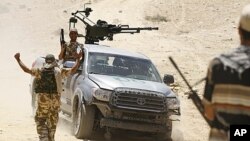Russia says France may have violated a U.N. arms embargo on Libya by air-dropping weapons to rebels fighting troops loyal to Libyan leader Moammar Gadhafi earlier this month.
Russian Foreign Minister Sergei Lavrov said Thursday Moscow has asked Paris to explain the arms drop to rebels in Libya's Western Mountains region. He says that if the incident is confirmed, it is a "flagrant violation" of a U.N. Security Council resolution that imposed an arms embargo on Libya in February.
French ambassador to the United Nations Gerard Araud said Wednesday the arms drop complies with a separate Security Council resolution adopted in March, establishing a no-fly zone over Libya to protect civilians. He says the French weapons are meant to defend Libyan civilians from attack by Gadhafi's forces.
NATO Secretary-General Anders Fogh Rasmussen said Thursday the alliance has no involvement in the French arms drop. France is a part of the NATO mission that has been carrying out weeks of air strikes on Libyan government targets to pressure Gadhafi into giving up power.
The Libyan leader has been using his forces to fight a pro-democracy rebellion that erupted in February against his 42-year autocratic rule.
British Foreign Secretary William Hague said Thursday that London is sending body armor, police uniforms and communications equipment to the Libyan rebels. He says the supplies include 5,000 sets of body armor, 6,650 police uniforms and 5,000 high-visibility vests.
Hague says the equipment will help Libya's opposition Transitional National Council to "better protect" rebel representatives and international aid communities in rebel-controlled areas.
A Chinese foreign ministry spokesman responded to a question about the French arms drop by calling on countries to avoid taking any action that goes beyond the mandate of the U.N. resolution authorizing the no-fly zone. China and Russia abstained from voting on that resolution.
French military spokesman Colonel Thierry Burkhard said Wednesday that France air-dropped light weapons into the Jebel Nafusa region of western Libya, including machine guns and rocket launchers.
Some information for this report was provided by AP, AFP and Reuters.




